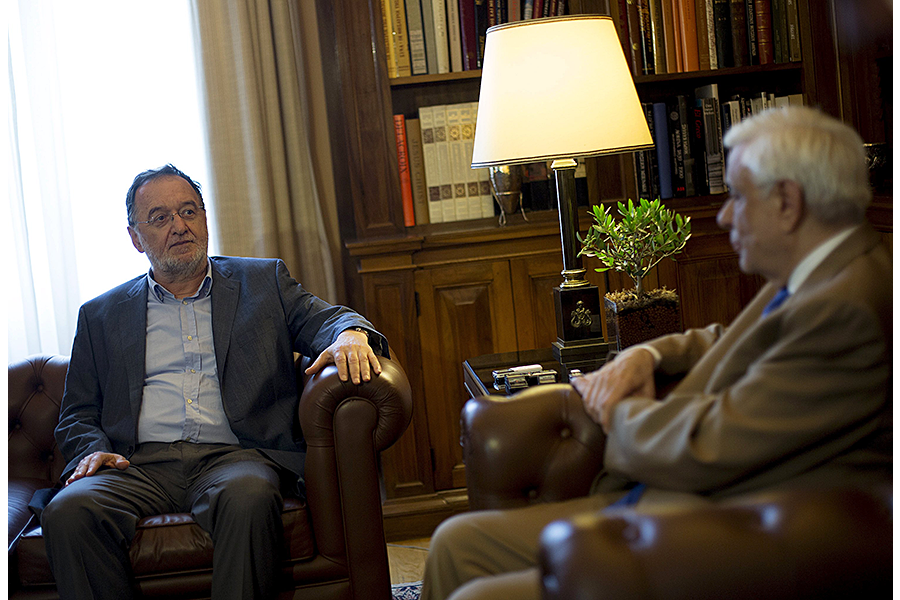Greece elections: New anti-bailout party receives mandate to form government
Loading...
| Athens, Greece
A new anti-austerity party formed by rebel lawmakers who quit the governing left-wing Syriza was given its chance Monday to seek government coalition partners and prevent Greece from holding its third national vote this year, although chances of averting the election are virtually nil.
Former Energy Minister Panagiotis Lafazanis, who heads the newly formed Popular Unity, received the maximum three-day mandate from the country's president after the head of the main opposition conservative New Democracy failed to form a government.
Neither of the two parties was expected to find willing coalition partners, and early elections are practically guaranteed in September following the resignation of Prime Minister Alexis Tsipras last week, seven months into his four-year term. The most likely date is seen as Sept. 20.
The renewed political uncertainty has hammered the Athens Stock Exchange. Dragged down by global jitters after China's market tumbled, the Athens general index closed down 10.5 percent, following two straight days of losses last week over election concerns.
Tsipras resigned on Thursday following a rebellion in his party over Greece's new bailout, which saw dozens of Syriza lawmakers dissent when the deal came to a vote in Parliament.
Syriza hardliners blasted the party's young leader for reneging on the promises which brought him to power in January elections to repeal austerity measures imposed in return for Greece's two previous international bailouts.
Already on an election footing, the new party has become one of Tsipras' fiercest critics.
"Some people think they can hide the consequences of the (bailout agreements) from the Greek people," Lafazanis said, commenting on Tsipras' decision to trigger elections, as he met with President Prokopis Pavlopoulos to receive the mandate to form a government. "This is democratic backtracking, if not an undemocratic aberration."
Despite acknowledging it has no chance of forming a government, Popular Unity says it will keep the mandate for the full three days.
"We don't have illusions. An anti-(bailout) government cannot be formed by this parliament," Lafazanis said. "But we will use this mandate to show that the only thing that works toward the interest of the country and the Greek people is to have a new anti-(bailout) parliament."
While some analysts have voiced concerns the election could derail the implementation of bailout measures Greece has signed up to, others argued it could lead to a more stable government.
"We believe Mr. Tsipras called for a snap election now to seek a fresh mandate to implement the latest agreement with Greece's creditors," said Alpona Banerji, vice president at Moody's ratings agency. "Mr. Tsipras' resignation offers the prospect of establishing a more effective government, perhaps involving a more moderate Syriza party governing alone or in a coalition with other pro-European parties.
"Whichever government emerges from the election, the next administration has little chance of being less cohesive than the present one," Banerji said.
Tsipras insists he had no choice but to accept the tax hikes and spending cuts demanded by European creditors in return for Greece's new three-year, 86 billion-euro ($99 billion) bailout, to prevent Greece from a potentially catastrophic default and being forced out of Europe's joint currency.
A war of words erupted between New Democracy and Syriza over the weekend when Tsipras refused to meet with New Democracy leader Evangelos Meimarakis as part of the exploratory mandate.
"Unfortunately, the country is being led to a catastrophic, in my opinion, course that could have been avoided, with the responsibility of Mr. Tsipras," Meimarakis said Monday during his meeting with Pavlopoulos, insisting there was still time for a meeting.
Under electoral regulations, each of the three largest parties in Parliament has a maximum three days to seek coalition partners. If no coalition can be formed, the president convenes a meeting of party leaders in a last-ditch attempt to find consensus before a caretaker government is appointed and an election date set.
This looms as the third time this year that Greeks vote, after the January election and a July referendum Tsipras called within a week, urging voters to reject creditor reform demands – which they overwhelmingly did.
Now Tsipras finds himself having to advocate for the implementation of measures he was elected on promises to abolish and then campaigned actively to reject.







